英语副词用法详解
英语副词的用法大全

英语副词的用法大全副词在句中可用作:1)状语(这是副词在句子中的主要功用)It is raining hard.雨下得很大。
(副词hard作状语,修饰动词is raining。
) Don't drive too fast.车子不要开得太快。
(fast是副词,作状语,修饰动词drive,副词too又修饰副词fast。
)He speaks English quite well.他英语讲得相当好。
(well修饰动词speaks,quite又修饰副词well。
)This is a fairly useful tool,这是一件相当有用的工具。
(fairly修饰形容词useful)He has always helped his sister with her homework.他一向帮助他妹妹做家庭作业。
(always修饰动词has helped)She often went there.她常到那儿去。
(often和there均是副词,修饰动词went。
)Perhaps he will telephone later.也许他以后会打电话来的。
(perhaps 是副词,用以修饰全句。
)2)表语Is he up?他起床了没有?She is out.她出去了。
3)定语Life here is full of joy.这儿的生活充满了欢乐。
(here修饰名词life) 副词的位置1)修饰动词时,有三种位置。
2)修饰形容词和副词时,须放在被修饰词之前。
如:It is a rather difficult job,这是一件颇为困难的工作。
(rather修饰形容词difficult)He runs very fast.他跑得很快。
(very修饰副词fast)3)副词作定语时,一般放在被修饰的名词之后。
如:The peasants there are busy digging a canal now.那里的农民现在正忙于修水渠。
英语中副词及用法
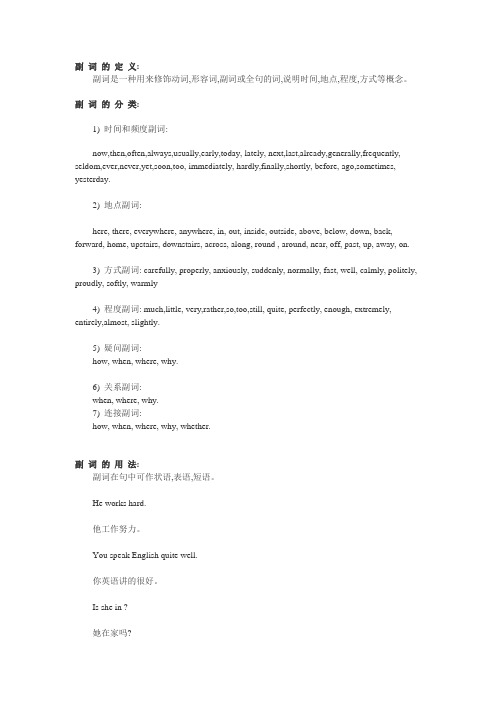
副词的定义:副词是一种用来修饰动词,形容词,副词或全句的词,说明时间,地点,程度,方式等概念。
副词的分类:1) 时间和频度副词:now,then,often,always,usually,early,today, lately, next,last,already,generally,frequently, seldom,ever,never,yet,soon,too, immediately, hardly,finally,shortly, before, ago,sometimes, yesterday.2) 地点副词:here, there, everywhere, anywhere, in, out, inside, outside, above, below, down, back, forward, home, upstairs, downstairs, across, along, round , around, near, off, past, up, away, on.3) 方式副词: carefully, properly, anxiously, suddenly, normally, fast, well, calmly, politely, proudly, softly, warmly4) 程度副词: much,little, very,rather,so,too,still, quite, perfectly, enough, extremely, entirely,almost, slightly.5) 疑问副词:how, when, where, why.6) 关系副词:when, where, why.7) 连接副词:how, when, where, why, whether.副词的用法:副词在句中可作状语,表语,短语。
He works hard.他工作努力。
英语副词的作用及用法
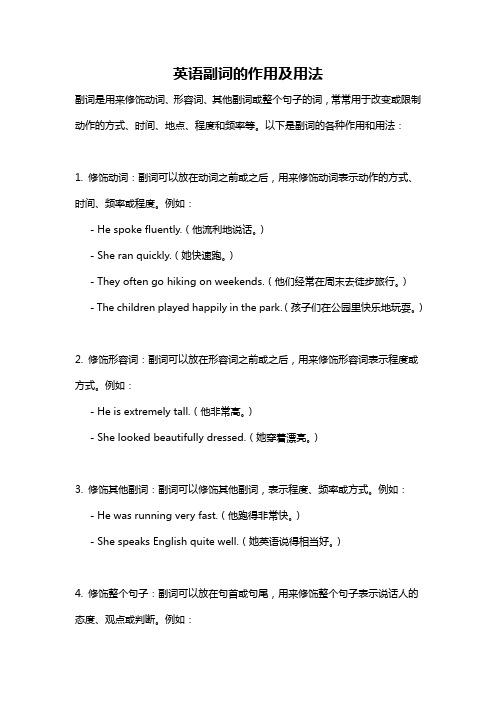
英语副词的作用及用法副词是用来修饰动词、形容词、其他副词或整个句子的词,常常用于改变或限制动作的方式、时间、地点、程度和频率等。
以下是副词的各种作用和用法:1. 修饰动词:副词可以放在动词之前或之后,用来修饰动词表示动作的方式、时间、频率或程度。
例如:- He spoke fluently.(他流利地说话。
)- She ran quickly.(她快速跑。
)- They often go hiking on weekends.(他们经常在周末去徒步旅行。
)- The children played happily in the park.(孩子们在公园里快乐地玩耍。
)2. 修饰形容词:副词可以放在形容词之前或之后,用来修饰形容词表示程度或方式。
例如:- He is extremely tall.(他非常高。
)- She looked beautifully dressed.(她穿着漂亮。
)3. 修饰其他副词:副词可以修饰其他副词,表示程度、频率或方式。
例如:- He was running very fast.(他跑得非常快。
)- She speaks English quite well.(她英语说得相当好。
)4. 修饰整个句子:副词可以放在句首或句尾,用来修饰整个句子表示说话人的态度、观点或判断。
例如:- Luckily, I found my keys.(幸运的是,我找到了我的钥匙。
)- Unfortunately, he couldn't join us for dinner.(不幸的是,他不能和我们一起吃晚餐。
)此外,副词还有许多特殊用法,如比较级和最高级形式(例如better, best)、表示否定(例如not, never)、表示位置(例如here, there)、表示时间(例如now, then)等。
需要注意的是,有些副词与形容词形式相同,例如fast既可以是形容词(表示快的),也可以是副词(表示快速地)。
英语副词用法

英语副词用法英语副词用法大全副词属于八大词类之一,用来修饰动词。
它们可以描述某事完成的方式、时间、地点以及频率。
下面关于五种副词的介绍。
五种类型的副词1.Adverbs of Manner方式副词方式副词能够表达出某人完成某事的方式,它最常与行为动词搭配使用。
方式副词包括:slowly(慢慢地)、fast(迅速地)、carefully(小心地)、carelessly(粗心地)、effortlessly(不费力地)、urgently(急切地)。
方式副词可以放在句末,或者直接放在动词后。
Jack drives very carefully.杰克开车非常小心。
He won the tennis match effortlessly.他毫不费力地就赢了网球比赛。
She slowly opened the present.她慢慢打开了礼物。
2.Adverbs of Time and Frequency时间与频率副词时间副词能够表达出某事发生的时间。
它可以表达出一个具体的时间,例如两天、昨天、三个星期前等。
虽然时间副词有时引导一个句子,但它常常放在句末。
We'll let you know our decision next week.下周我们会通知你我们的决定。
I flew to Dallas three weeks ago.三个星期前我飞去了达拉斯。
Yesterday, I received a letter from my friend in Belfast.昨天,我收到一位贝尔法斯特的朋友的信。
除了表达某事发生的频率之外,频率副词与一般副词相似。
频率副词放在主动词前面,放在be动词后面。
下面是一份常见的频率副词列表,使用频率由高到低排列。
Always总是almost always几乎总是usually经常often经常sometimes有时occasionally偶尔seldom很少地rarely很少地almost never几乎从不never从不He seldom takes a vacation.他的假期很少。
英语副词的用法
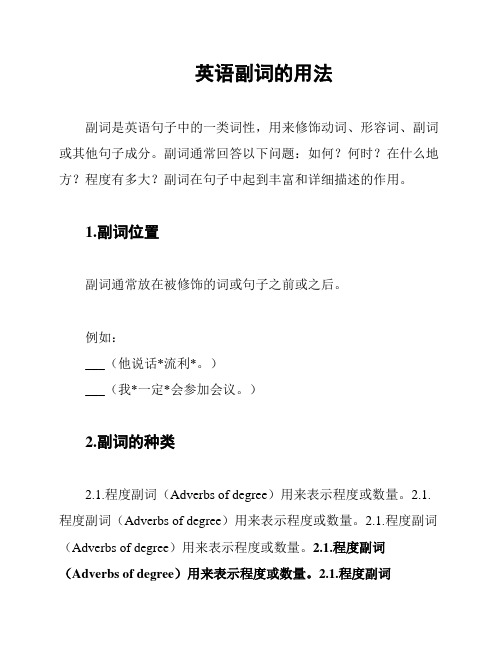
英语副词的用法副词是英语句子中的一类词性,用来修饰动词、形容词、副词或其他句子成分。
副词通常回答以下问题:如何?何时?在什么地方?程度有多大?副词在句子中起到丰富和详细描述的作用。
1.副词位置副词通常放在被修饰的词或句子之前或之后。
例如:___(他说话*流利*。
)___(我*一定*会参加会议。
)2.副词的种类2.1.程度副词(Adverbs of degree)用来表示程度或数量。
2.1.程度副词(Adverbs of degree)用来表示程度或数量。
2.1.程度副词(Adverbs of degree)用来表示程度或数量。
2.1.程度副词(Adverbs of degree)用来表示程度或数量。
2.1.程度副词(Adverbs of degree)用来表示程度或数量。
2.1.程度副词(Adverbs of degree)用来表示程度或数量。
2.1.程度副词(Adverbs of degree)用来表示程度或数量。
2.1.程度副词(Adverbs of degree)用来表示程度或数量。
2.1.程度副词(Adverbs of degree)用来表示程度或数量。
例如:___(她非常有才华。
)I am *quite* sure about it。
(我对此非常确定。
)2.2.方式副词(Adverbs of manner)用来表示动作的方式或方式的特征。
2.2.方式副词(Adverbs of manner)用来表示动作的方式或方式的特征。
2.2.方式副词(Adverbs of manner)用来表示动作的方式或方式的特征。
2.2.方式副词(Adverbs of manner)用来表示动作的方式或方式的特征。
2.2.方式副词(Adverbs of manner)用来表示动作的方式或方式的特征。
2.2.方式副词(Adverbs of manner)用来表示动作的方式或方式的特征。
2.2.方式副词(Adverbs of manner)用来表示动作的方式或方式的特征。
【英语】英语副词用法详解
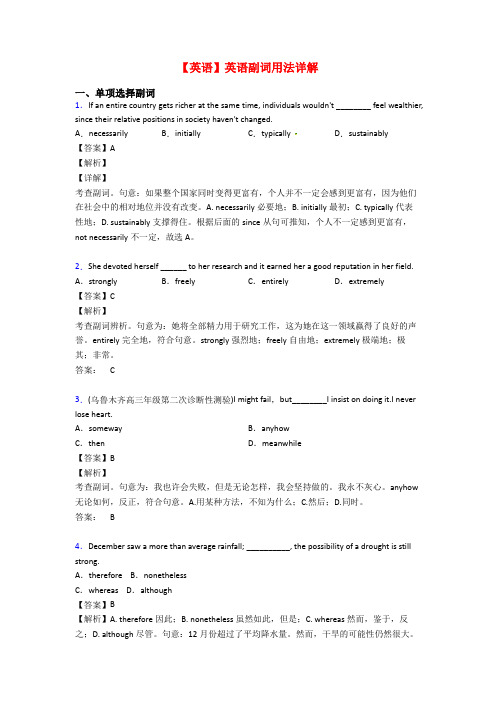
【英语】英语副词用法详解一、单项选择副词1.If an entire country gets richer at the same time, individuals wouldn't ________ feel wealthier, since their relative positions in society haven't changed.A.necessarily B.initially C.typically D.sustainably【答案】A【解析】【详解】考查副词。
句意:如果整个国家同时变得更富有,个人并不一定会感到更富有,因为他们在社会中的相对地位并没有改变。
A. necessarily必要地;B. initially最初;C. typically代表性地;D. sustainably支撑得住。
根据后面的since从句可推知,个人不一定感到更富有,not necessarily不一定,故选A。
2.She devoted herself ______ to her research and it earned her a good reputation in her field. A.strongly B.freely C.entirely D.extremely【答案】C【解析】考查副词辨析。
句意为:她将全部精力用于研究工作,这为她在这一领域赢得了良好的声誉。
entirely完全地,符合句意。
strongly强烈地;freely自由地;extremely极端地;极其;非常。
答案:C3.(乌鲁木齐高三年级第二次诊断性测验)I might fail,but________I insist on doing it.I never lose heart.A.someway B.anyhowC.then D.meanwhile【答案】B【解析】考查副词。
句意为:我也许会失败,但是无论怎样,我会坚持做的。
英语中副词的用法

精选课件
4
3) 方式副词:
carefully, properly(适当地), anxiously(焦虑地), suddenly, normally(正常地), fast, well, calmly(冷静 地), politely(有礼貌地), proudly(自豪地), softly, warmly ,slowly
精选课件
12
6)否定副词在句首,句子要部分倒装,如: Never have I felt so excited! 我从来没有觉得这么激动!
精选课件
13
比较等级
副词和形容词一样,也有它的比较级和最高 级形式. 可以参考形容词的变换形式。但以 词尾 -ly 结尾的副词(除 early 本来就原 形)须用 more 和 most 。
于much The plane was flying high. I think highly of your opinion.
精选课件
23
5) wide与widely
wide表示空间宽度;widely意思是"广泛 地","在许多地方"
He opened the door wide.
English is widely used in the world.
〔C〕 you run for fifteen minutes
〔D〕 fifteen?minute walking
2) The gorilla(大猩猩), while 〔A〕 not quite as curious than 〔B〕 the chimpanzee(黑 猩猩), shows more persistence 〔C〕 and memory retention(记忆力) in solving 〔D〕 a problem.
英语副词用法详解
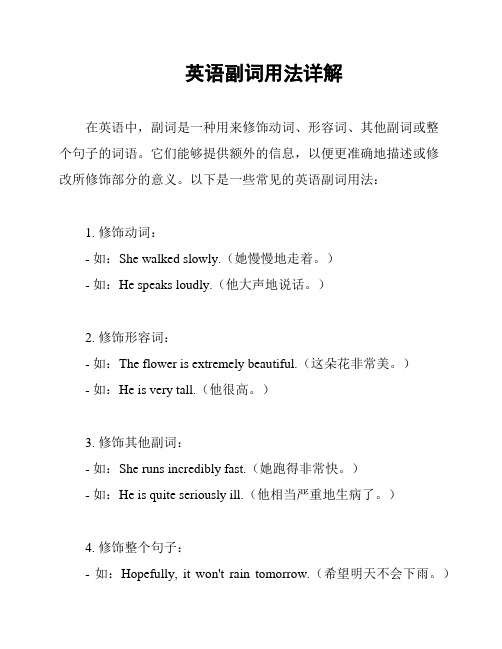
英语副词用法详解在英语中,副词是一种用来修饰动词、形容词、其他副词或整个句子的词语。
它们能够提供额外的信息,以便更准确地描述或修改所修饰部分的意义。
以下是一些常见的英语副词用法:1. 修饰动词:- 如:She walked slowly.(她慢慢地走着。
)- 如:He speaks loudly.(他大声地说话。
)2. 修饰形容词:- 如:The flower is extremely beautiful.(这朵花非常美。
)- 如:He is very tall.(他很高。
)3. 修饰其他副词:- 如:She runs incredibly fast.(她跑得非常快。
)- 如:He is quite seriously ill.(他相当严重地生病了。
)4. 修饰整个句子:- 如:Hopefully, it won't rain tomorrow.(希望明天不会下雨。
)- 如:Interestingly, he never mentioned it before.(有趣的是,他以前从未提过。
)5. 常见的副词类型:- 地点副词:here, there, everywhere(这里,那里,到处)- 方式副词:quickly, slowly, loudly(快速地,慢慢地,大声地)- 频度副词:always, never, sometimes(总是,从不,有时候)- 时间副词:now, then, tomorrow(现在,然后,明天)- 程度副词:very, extremely, quite(非常,极度,相当)请注意,副词的使用方式有时候是固定的,有时候也会根据上下文的需要而变化。
掌握副词的正确用法将有助于提高你的英语表达能力。
以上是英语副词用法的简要介绍,希望对你有所帮助!。
英语副词用法
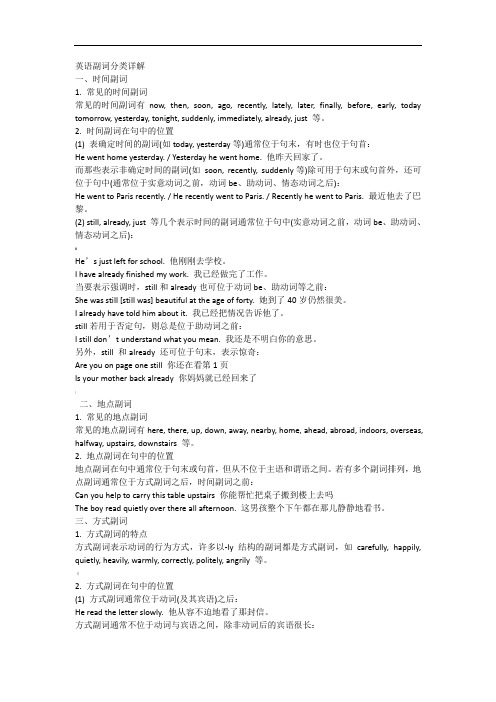
英语副词分类详解一、时间副词1. 常见的时间副词常见的时间副词有now, then, soon, ago, recently, lately, later, finally, before, early, today tomorrow, yesterday, tonight, suddenly, immediately, already, just 等。
2. 时间副词在句中的位置(1) 表确定时间的副词(如today, yesterday等)通常位于句末,有时也位于句首:He went home yesterday. / Yesterday he went home. 他昨天回家了。
而那些表示非确定时间的副词(如soon, recently, suddenly等)除可用于句末或句首外,还可位于句中(通常位于实意动词之前,动词be、助动词、情态动词之后):He went to Paris recently. / He recently went to Paris. / Recently he went to Paris. 最近他去了巴黎。
(2) still, already, just 等几个表示时间的副词通常位于句中(实意动词之前,动词be、助动词、情态动词之后):#He’s just left for school. 他刚刚去学校。
I have already finished my work. 我已经做完了工作。
当要表示强调时,still和already也可位于动词be、助动词等之前:She was still [still was] beautiful at the age of forty. 她到了40岁仍然很美。
I already have told him about it. 我已经把情况告诉他了。
still若用于否定句,则总是位于助动词之前:I still don’t understand what you mean. 我还是不明白你的意思。
【英语】副词详解+例句
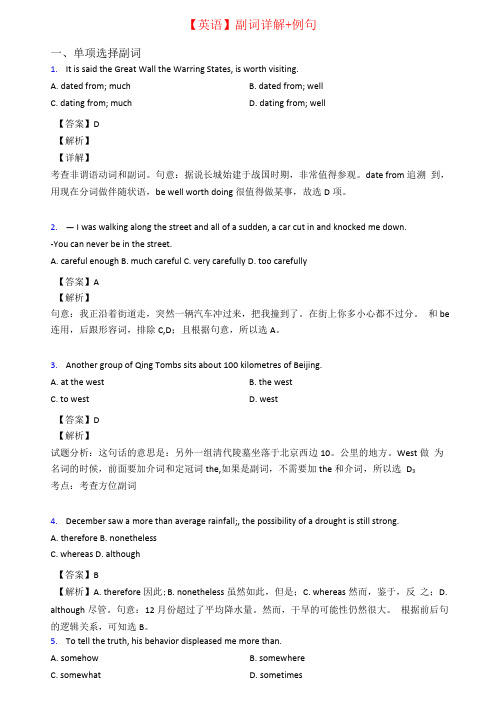
【英语】副词详解+例句一、单项选择副词1.It is said the Great Wall the Warring States, is worth visiting.A. dated from; muchB. dated from; wellC. dating from; muchD. dating from; well【答案】D【解析】【详解】考查非谓语动词和副词。
句意:据说长城始建于战国时期,非常值得参观。
date from追溯到,用现在分词做伴随状语,be well worth doing很值得做某事,故选D项。
2.— I was walking along the street and all of a sudden, a car cut in and knocked me down.-You can never be in the street.A. careful enoughB. much carefulC. very carefullyD. too carefully【答案】A【解析】句意:我正沿着街道走,突然一辆汽车冲过来,把我撞到了。
在街上你多小心都不过分。
和be 连用,后跟形容词,排除C,D;且根据句意,所以选A。
3.Another group of Qing Tombs sits about 100 kilometres of Beijing.A. at the westB. the westC. to westD. west【答案】D【解析】试题分析:这句话的意思是:另外一组清代陵墓坐落于北京西边10。
公里的地方。
West做为名词的时候,前面要加介词和定冠词the,如果是副词,不需要加the和介词,所以选D3考点:考查方位副词4.December saw a more than average rainfall;, the possibility of a drought is still strong.A. thereforeB. nonethelessC. whereasD. although【答案】B【解析】A. therefore因此;B. nonetheless虽然如此,但是;C. whereas然而,鉴于,反之;D. although尽管。
小学英语单词:副词的用法

小学英语单词:副词的用法小学英语单词:副词的用法副词(Adverb)是指在句子中表示行为或状态特征的词,用以修饰动词、形容词、其他副词或全句,表示时间、地点、程度、方式等概念。
副词可分为:时间副词、频率副词、地点副词、方式副词、程度副词、疑问副词、连接副词、关系副词、表顺序的副词。
下面是店铺收集的关于副词的知识点,有兴趣的朋友们可以看看。
1. 副词的用法:(1)修饰动词: He works hard. He speaks slowly.(2)修饰形容词: The flower is very beautiful.(3)修饰其他副词: He works very hard.(4)修饰名词: Even a child (or Even he)can do it.(5)修饰全句: Probably he will come back.(6)修饰副词片语:He came exactly at two o‘clock.(7)修饰副词子句: He started soon after we came.2. 副词的位置(1)副词修饰形容词、副词(片语或子句)时,通常放在前面。
The mountain is very beautiful.He came long before the appointed time.(2)修饰动词的副词不及物动词 + 副词 She speaks well.及物动词 + 受词 + 副词 She speaks English well.(3)表确定时间或场所的副词,通常放在句首或句末,放在句首时语气较强。
She was born in Taipei in 1948.(4)always, never, often, sometimes, usually等频率副词的位置。
(A)在一般动词前: They always say so.(B)有动词be时,在be动词后: I am always busy.(C)有助动词时,在助动词和本动词间: This job will never be finished.(5)置于句首修饰全句:Fortunately he succeeded in the examination.(6)同类两个以上的`副词须依 (单位较小者 + 单位较大者)的顺序排列。
【最详细】初中英语---副词基本用法详解
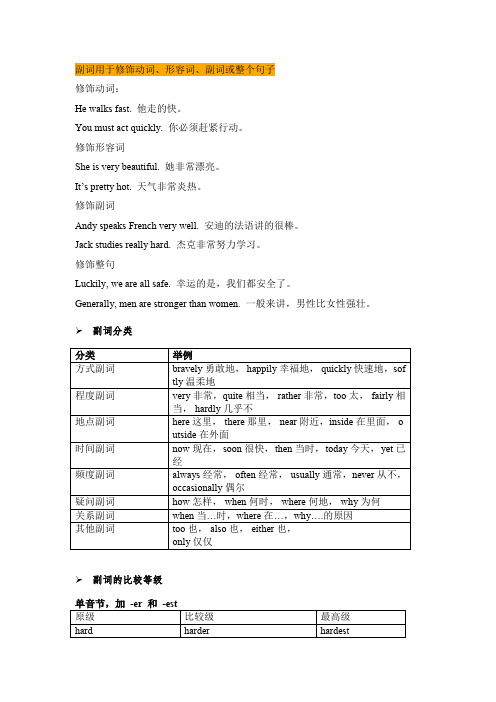
副词用于修饰动词、形容词、副词或整个句子修饰动词:He walks fast. 他走的快。
You must act quickly. 你必须赶紧行动。
修饰形容词She is very beautiful. 她非常漂亮。
It’s pretty hot. 天气非常炎热。
修饰副词Andy speaks French very well. 安迪的法语讲的很棒。
Jack studies really hard. 杰克非常努力学习。
修饰整句Luckily, we are all safe. 幸运的是,我们都安全了。
Generally, men are stronger than women. 一般来讲,男性比女性强壮。
副词分类副词的比较等级1.farther/ farthest, further /furthest的用法1)farther/ farthest和further /furthest都可用于表示距离和时间上的远We can go farther/further. 我们可以走的更远。
We can look back farther/further into the past to find the truth. 我们可以追溯到更久之前以寻求真相。
2)further /furthest 还可表示程度上的“深远”“进一步”The police will research further into this matter. 警察会更加深入调查此事的。
副词的比较级句型……as+副词原级+as….该句型表示:….和…..一样He speaks as loudly as you do. 他说话和你一样大声。
He sings as beautifully as she does. 他和她一样唱的好。
….not as (so)+副词原级+as...该句型表示:…..不如…..I can’t walk as/so fast as you. 我没法走的和你一样快。
副词的用法初中英语知识归纳
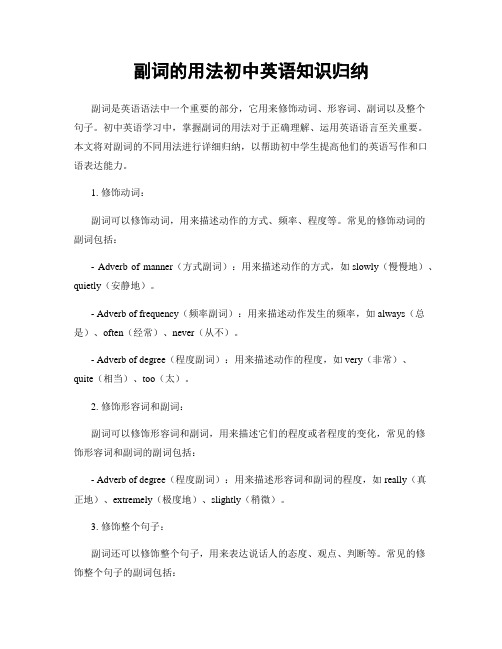
副词的用法初中英语知识归纳副词是英语语法中一个重要的部分,它用来修饰动词、形容词、副词以及整个句子。
初中英语学习中,掌握副词的用法对于正确理解、运用英语语言至关重要。
本文将对副词的不同用法进行详细归纳,以帮助初中学生提高他们的英语写作和口语表达能力。
1. 修饰动词:副词可以修饰动词,用来描述动作的方式、频率、程度等。
常见的修饰动词的副词包括:- Adverb of manner(方式副词):用来描述动作的方式,如slowly(慢慢地)、quietly(安静地)。
- Adverb of frequency(频率副词):用来描述动作发生的频率,如always(总是)、often(经常)、never(从不)。
- Adverb of degree(程度副词):用来描述动作的程度,如very(非常)、quite(相当)、too(太)。
2. 修饰形容词和副词:副词可以修饰形容词和副词,用来描述它们的程度或者程度的变化,常见的修饰形容词和副词的副词包括:- Adverb of degree(程度副词):用来描述形容词和副词的程度,如really(真正地)、extremely(极度地)、slightly(稍微)。
3. 修饰整个句子:副词还可以修饰整个句子,用来表达说话人的态度、观点、判断等。
常见的修饰整个句子的副词包括:- Adverb of attitude(态度副词):用来表示说话人的态度或者观点,如honestly(诚实地)、clearly(明确地)。
- Adverb of place(地点副词):用来描述说话人的位置或者观点位置,如here (这里)、there(那里)。
4. 修饰其他的词性:除了上述常见的用法之外,副词还可以修饰其他的词性,比如名词、代词等,用来表达某种属性或者方式。
常见的修饰其他词性的副词包括:- Adverb of quantity(数量副词):用来修饰名词,表示数量,如very(非常)、quite(相当)。
英语常见副词用法详解
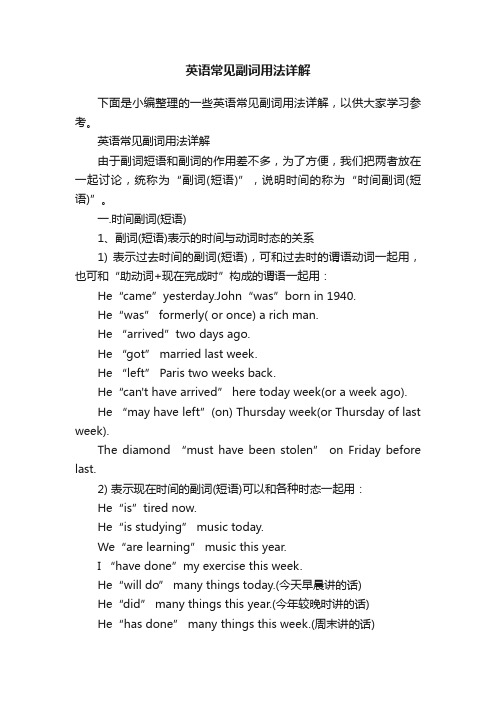
英语常见副词用法详解下面是小编整理的一些英语常见副词用法详解,以供大家学习参考。
英语常见副词用法详解由于副词短语和副词的作用差不多,为了方便,我们把两者放在一起讨论,统称为“副词(短语)”,说明时间的称为“时间副词(短语)”。
一.时间副词(短语)1、副词(短语)表示的时间与动词时态的关系1) 表示过去时间的副词(短语),可和过去时的谓语动词一起用,也可和“助动词+现在完成时”构成的谓语一起用:He“came”yesterday.John“was”born in 1940.He“was” formerly( or once) a rich man.He “arrived”two days ago.He “got” married last week.He “left” Paris two weeks back.He“can't have arrived” here today week(or a week ago).He “may have left”(on) Thursday week(or Thursday of last week).The diamond “must have been stolen” on Friday before last.2) 表示现在时间的副词(短语)可以和各种时态一起用:He“is”tired now.He“is studying” music today.We“are learning” music this year.I “have done”my exercise this week.He“will do” many things today.(今天早晨讲的话)He“did” many things this year.(今年较晚时讲的话)He“has done” many things this week.(周末讲的话)3) 有些副词(短语),可和现在完成时或一般过去时的动词一起用:I“saw”(or“have seen”) him lately(or of late,recently,before,before now,all along,right along, in the past,over the years).He has just gone out.(英式)He just went out.(美式)4) 有些副词(短语),多和完成时态的动词一起用,偶尔和其他时态的动词一起用:He“has been” ill since 2 June(or ever since,since two months ago).Till now(or Up to now,Until this time)nothing“has happened”.So far(or As yet,Thus far) he“had said” nothing to me.So far he “was trying” without success.There “is” as yet no hope for peace.The guests “(had) arrived” by([=before or at] seven o'clock).5) 表示未来时间的副词(短语),必须和将来时或现在(一般或进行)时的动词一起用:He“will come” tomorrow.I“shall meet” him some day(or one day).He“will begin” his work next week.He“will call” on me in ten days(or in ten days time,ten days from now).He“will do” it soon(or shortly,presently,instantly,before long,by and by).(这6个副词及副词短语也可以和过去将来时的动词一起用:He“would do”it soon.He “would come” shortly.)He“arrives”this coming Thursday.He“is to move”(on)Friday(of)next week.He“is leaving” today week(or a week from today).He“is returning” this day month(or a month from this day).6) 个别副词(短语)可以和过去时或将来时的动词一起用:She came last Monday and he “came” the day before(or two days later).She will come next Monday,and he “will come” the day be- fore(or two days later).7) 频度副词(短语)可以和任何时态的动词一起用:He“studied”(or“had studied”,“was studying”,“studies”,“is studying”,“has studied”,“will study”)every day.He“is”always(or often,frequently,sometimes,occasion- ally,seldom,rarely,scarcely,hardly,never)ill.I“have warned” him once again(or a time or two,once in a long while,now and then,now and again,again and again,time and again,over and over again ).He will be permanently(or forever)blind.The periodical“is” published daily(or weekly,monthly,quarterly,yearly).8) 表示时间长度的副词(短语)可以和任何时态的动词一起用:He“stayed”in France(for)three years.They“gambled” all the year(round).They “gambled” all the night (thro ugh).He“started”work from 1950.He“served”his country till his death.He“will work” for me during my absence.He “can cross” the river in thirty minutes(or in a short time).We“are working” all(the) day long.The fish “will not live”over the night(or over this week).He“has done” much over the year.I “have done”nothing during the vacation.2、某些时间副词(短语)的特殊用法1) 有些时间副词(短语)的特殊用法值得注意:I shall go tomorrow(=the day after today).但:He went last Sunday,(or on the following day)(不能说I went on tomorrow).但:He went last Sunday,and I went on the previous day (or the day before)(不能说yesterday).He will go next Sunday,and I will go on the previous day(or the day be- fore)(不能说yesterday).2)I saw him three days ago(=on the third day before to- day).但:I arrived last Sunday and I informed him of my arrival three days before(=on the third day before last Sunday)(不能说three days ago).3)I shall see him in three days(=on the third day after to- day)(不要说after three days).但:I arrived last Sunday and I saw him three days later (or three days afterwards,after three days,in three days).I shall arrive on 6 July and will see him three days later(or three days afterwards,after three days,in three days).。
英语副词和名词用法总结
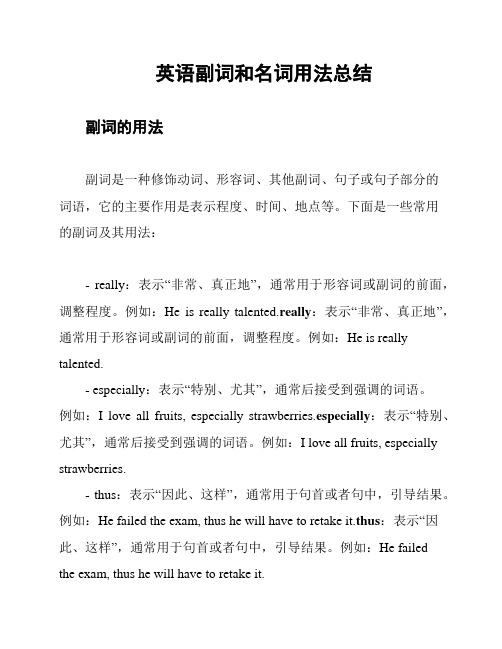
英语副词和名词用法总结副词的用法副词是一种修饰动词、形容词、其他副词、句子或句子部分的词语,它的主要作用是表示程度、时间、地点等。
下面是一些常用的副词及其用法:- really:表示“非常、真正地”,通常用于形容词或副词的前面,调整程度。
例如:He is really talented.really:表示“非常、真正地”,通常用于形容词或副词的前面,调整程度。
例如:He is really talented.- especially:表示“特别、尤其”,通常后接受到强调的词语。
例如:I love all fruits, especially strawberries.especially:表示“特别、尤其”,通常后接受到强调的词语。
例如:I love all fruits, especially strawberries.- thus:表示“因此、这样”,通常用于句首或者句中,引导结果。
例如:He failed the exam, thus he will have to retake it.thus:表示“因此、这样”,通常用于句首或者句中,引导结果。
例如:He failedthe exam, thus he will have to retake it.- now:表示“现在、目前”,通常用于句首或者句中,强调时间。
例如:Now we can start the meeting.now:表示“现在、目前”,通常用于句首或者句中,强调时间。
例如:Now we can start the meeting.名词的用法名词是一种用来指称人、事物、概念等的词语,它的主要作用是表示所指对象的名称。
下面是一些常用的名词及其用法:- information:表示“信息、资料”,是一个不可数名词,通常在使用时需要考虑单复数。
例如:I need more information about this rmation:表示“信息、资料”,是一个不可数名词,通常在使用时需要考虑单复数。
最新英语副词用法详解
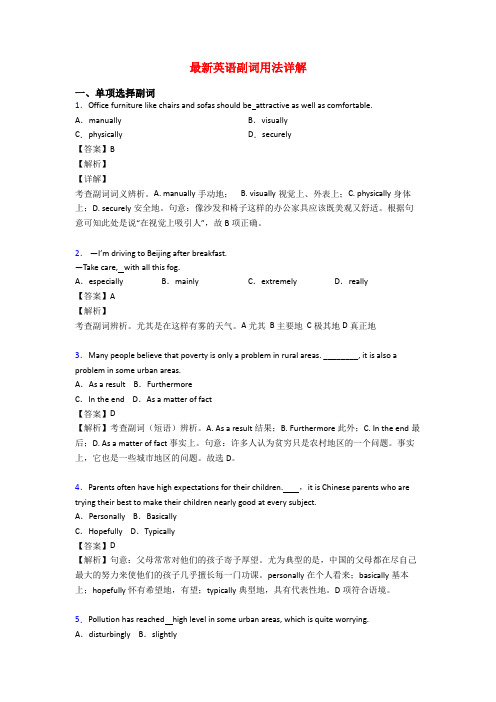
最新英语副词用法详解一、单项选择副词1.Office furniture like chairs and sofas should be attractive as well as comfortable. A.manually B.visuallyC.physically D.securely【答案】B【解析】【详解】考查副词词义辨析。
A. manually手动地; B. visually视觉上、外表上;C. physically身体上;D. securely安全地。
句意:像沙发和椅子这样的办公家具应该既美观又舒适。
根据句意可知此处是说“在视觉上吸引人”,故B项正确。
2.—I’m driving to Beijing after breakfast.—Take care, with all this fog.A.especially B.mainly C.extremely D.really【答案】A【解析】考查副词辨析。
尤其是在这样有雾的天气。
A 尤其 B 主要地 C极其地D真正地3.Many people believe that poverty is only a problem in rural areas. ________, it is also a problem in some urban areas.A.As a result B.FurthermoreC.In the end D.As a matter of fact【答案】D【解析】考查副词(短语)辨析。
A. As a result结果;B. Furthermore此外;C. In the end最后;D. As a matter of fact事实上。
句意:许多人认为贫穷只是农村地区的一个问题。
事实上,它也是一些城市地区的问题。
故选D。
4.Parents often have high expectations for their children. ,it is Chinese parents who are trying their best to make their children nearly good at every subject.A.Personally B.BasicallyC.Hopefully D.Typically【答案】D【解析】句意:父母常常对他们的孩子寄予厚望。
英语中副词及用法
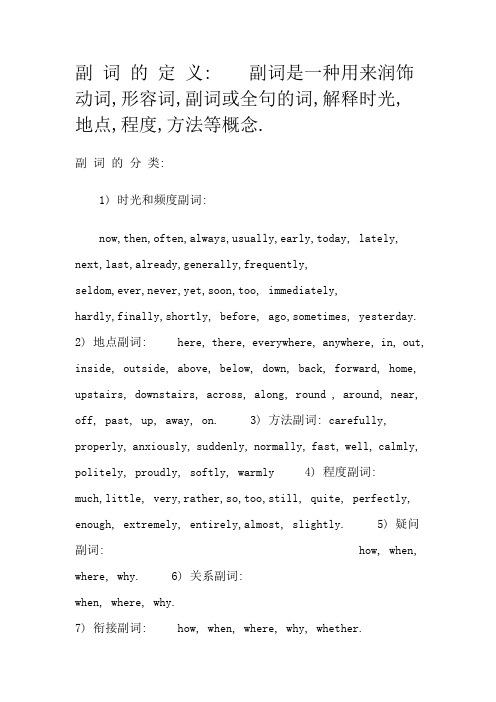
副词的定义: 副词是一种用来润饰动词,形容词,副词或全句的词,解释时光,地点,程度,方法等概念.副词的分类:1) 时光和频度副词:now,then,often,always,usually,early,today, lately, next,last,already,generally,frequently,seldom,ever,never,yet,soon,too, immediately,hardly,finally,shortly, before, ago,sometimes, yesterday.2) 地点副词: here, there, everywhere, anywhere, in, out, inside, outside, above, below, down, back, forward, home, upstairs, downstairs, across, along, round , around, near, off, past, up, away, on. 3) 方法副词: carefully, properly, anxiously, suddenly, normally, fast, well, calmly, politely, proudly, softly, warmly 4) 程度副词:much,little, very,rather,so,too,still, quite, perfectly, enough, extremely, entirely,almost, slightly. 5) 疑问副词: how, when, where, why. 6) 关系副词:when, where, why.7) 衔接副词: how, when, where, why, whether.副词的用法: 副词在句中可作状语,表语,短语. He works hard. 他工作尽力. You speak English quite well. 你英语讲的很好. Is she in ? 她在家吗? Let's be out. 让我们出去吧. Food here is hard to get. 这儿很难弄到食物.副词的位置:1) 多半副词都可以放在动词的后面,假如动词带有宾语,副词就放在宾语后面. I get up early in the morning everyday. 我天天早夙兴床. He gave me a gift yesterday. 他昨天给了我一件礼品. She didn't drink water enough. 她没喝够水. The train goes fast. 火车跑得快. We can go to this school freely. 我们可以免费到这家黉舍进修. They left a life hardly then. 当时他们的生涯很艰苦. He has a new cat on today. 他今天戴了一顶新帽子. I have seen this film twice with my friends. 这部片子我和同伙看过两次. 2) 副词润饰形容词,副词时,副词在前面,而被润饰的词在后面. It's rather easy, I can do it. 这很轻易,我能做到. He did it quite well. 他做得相当好. It's rather difficult to tell who is right. 很难说谁是对的. It's so important that I must tell my friends. 这件事太主要了,我得告知我的同伙. It'smuch better. 很多多少了. 3) 频度副词可放在实义动词的前面,情态动词和助动词的后面. I often help him these days. 这些日子我经常帮忙他. I always remember the day when I first came to this school. 我经常记得我第一次来黉舍的那一天. You mustn't always help me.你不克不及老是帮忙我. He seldom comes to see us. 他很少来看我们. We usually go shopping once a week. 我们平日一周买一次器械. The new students don't always go to dance. 新学生其实不时常去跳舞. 4) 疑问副词,衔接副词,关系副词以及润饰全部句子的副词,平日放在句子或从句的前面. When do you study everyday? 你天天什么时光进修? Can you tell me how you did it? 你能告知我你若何做的吗? First, let me ask you some questions. 先让我来问几个问题. How much does this bike cost? 这辆车子若干钱?Either you go or he comes. 不是你去就是他来. The students were reading when the teacher came into the classroom. 当先生进教室时,学生们正在念书.5) 时光副词和地点副词在一个句中, 地点副词在前面时光副词在后面. We went shopping in the supermarket at 9 o'clock yesterday. 昨天九点钟我们到超市买器械了. Whatwere you doing in the classroom yesterday evening? 昨世界午你在教室里干什么?The accident took place onehour ago in the Eleven Avenue. 一小时前十一号大街产生了一场变乱.副词的比较等级:副词和形容词一样,也有它的比较级和最高等情势. 可以参考形容词的变换情势.但以词尾 -ly 结尾的副词(除 early )须用more 和 most . hard harder hardest fast faster fastest early earlier earliest much more most warmly more warmly most warmly 单音节副词的比较级是在副词后面加上 -er 组成的,最高等是在副词后面加上 -est组成的. near nearer nearest hard harder hardest 多音节副词的比较级是在副词的前面加上 -more 组成的. 最高等是在副词前面加上 -most 组成的. warmly more warmly most warmly successfully more successfully most successfully 有些副词的比较级和最高等情势是不规矩的. well-better - best little - less - least Much- more - most badly - worse - worstfar-farther(further)-farthest(furthest) 副词的比较级和最高等用法同形容词的比较级用法根本一样. 最高等情势句中 the 可以省略. He works harder than I. 他比我工作尽力. Lucy gets up earlier than Lili. 露西比丽丽起床早.He runs fastest in our class. 他在我们班跑地最快.He dives deeper than his teammates. 他比他的队员潜水深. It's true that he speak English more fluently than any of us. 他英语讲的确切比我们任何人都好. Our school team play football best in our region. 我们校队在我们地区足球踢得最好的.。
英语副词用法
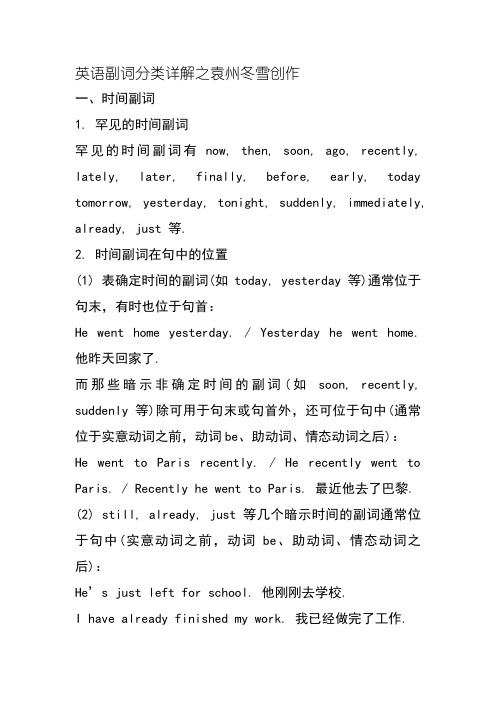
英语副词分类详解之袁州冬雪创作一、时间副词1. 罕见的时间副词罕见的时间副词有now, then, soon, ago, recently, lately, later, finally, before, early, today tomorrow, yesterday, tonight, suddenly, immediately, already, just 等.2. 时间副词在句中的位置(1) 表确定时间的副词(如today, yesterday等)通常位于句末,有时也位于句首:He went home yesterday. / Yesterday he went home. 他昨天回家了.而那些暗示非确定时间的副词(如soon, recently, suddenly等)除可用于句末或句首外,还可位于句中(通常位于实意动词之前,动词be、助动词、情态动词之后):He went to Paris recently. / He recently went to Paris. / Recently he went to Paris. 最近他去了巴黎. (2) still, already, just 等几个暗示时间的副词通常位于句中(实意动词之前,动词be、助动词、情态动词之后):He’s just left for school. 他刚刚去学校.I have already finished my work. 我已经做完了工作.当要暗示强调时,still和already也可位于动词be、助动词等之前:She was still [still was] beautiful at the age of forty. 她到了40岁仍然很美.I already have told him about it. 我已经把情况告诉他了.still若用于否定句,则总是位于助动词之前:I still don’t understand what you mean. 我还是不大白你的意思.别的,still 和already 还可位于句末,暗示诧异:Are you on page one still? 你还在看第1页?Is your mother back already? 你妈妈就已经回来了?二、地点副词1. 罕见的地点副词罕见的地点副词有here, there, up, down, away, nearby, home, ahead, abroad, indoors, overseas, halfway, upstairs, downstairs 等.2. 地点副词在句中的位置地点副词在句中通常位于句末或句首,但从不位于主语和谓语之间.若有多个副词摆列,地点副词通常位于方式副词之后,时间副词之前:Can you help to carry this table upstairs? 你能辅佐把桌子搬到楼上去吗?The boy read quietly over there all afternoon. 这男孩整个下午都在那儿静静地看书.三、方式副词1. 方式副词的特点方式副词暗示动词的行为方式,许多以-ly布局的副词都是方式副词,如carefully, happily, quietly, heavily, warmly, correctly, politely, angrily 等.2. 方式副词在句中的位置(1) 方式副词通常位于动词(及其宾语)之后:He read the letter slowly. 他从容不迫地看了那封信.方式副词通常不位于动词与宾语之间,除非动词后的宾语很长:不成说:We like very much it. (应改为We like it very much.)但可说:We could see very clearly a strange light ahead of us. 我们可以很清楚地看到在我们前方有一道奇怪的光.若遇到“动词+介词+宾语”布局,方式副词既可位于“介词+宾语”之前,也可位于“介词+宾语”之后,但是若该布局的宾语较长,则方式副词通常位于“介词+宾语”之前:He looked at me curiously. / He looked curiously at me. 他好奇地打量着我.He looked curiously at everyone who got off the plane. 他好奇地打量着从飞机上走下来的每个人.(2) 方式副词(主要是单个的方式副词)有时也可位于主语与动词之间:He quickly got dressed. 他赶紧穿好衣服.He angrily tore up the letter. 他很生气,把信撕碎了.(3) 有的方式副词(如bravely, cleverly, cruelly, foolishly, generously, kindly, secretly, simply等)位于动词之前和位于句末会导致句子意思的变更:They secretly decided to leave the town. 他们奥秘决议分开这个城市.They decided to leave the town secretly. 他们决议奥秘地分开这个城市.He answered the questions foolishly. 他对这个问题作了愚蠢的回答.He foolishly answered the questions. 他愚蠢地回答了这个问题.(4) 有的方式副词(如gently, quietly, slowly, suddenly 等)有时可位于句首,以达到某种戏剧性的效果(这主要见于书面语中):Suddenly, the driver started the engine. 突然地,司机启动了发动机.四、频度副词1. 频度副词的特点频度副词暗示动作发生的次数,罕见有的ever, never, rarely, seldom, once, often, occasionally, constantly, frequently, usually, continually, always 等.2. 频度副词在句中的位置频度副词通常位于实意动词之前,动词be、助动词、情态动词之后:He often comes to see us. 他常来看我们.He is seldom late for school. 他上学很少迟到.有时为了强调,频度副词也可位于动词be、助动词等之前:She always was late. 她总是迟到.有的频度副词可位于句末(尤其受very, only修饰时):I get paid on Fridays usually. 我通常在星期五领工资. We go out very seldom. 我们很少外出.Do you go to the cinema very often? 你常去看电影吗?有的频度副词(如sometimes, often, usually, frequently, occasionally等)可位于句首(此时多半是因为强调或对比):Sometimes he went there by bus. 有时他坐公共汽车去那儿.Very often the phone rings when I’m in the bath. 电话常常在我洗澡时响.【注】含有否定意义的频度副词置于句首时,其后要用倒装语序:Never have I been there. 我从未去过那儿.Seldom does he see a film. 他很少看电影.别的,频度副词always 和 never通常不位于句首,除非是祈使句:Always remember this. 时刻记住这一点.Never go out at night. 晚上千万不要出去.3. 频度副词在否定句中的位置在否定句中,有的频度副词可位于否定词not之后或之前(如usually, often),有的频度副词则必须位于否定词之后(如always, constantly, continually, continuously,均含有“持续不竭”之意),而有的频度副词却必须要位于否定词not之前(如sometimes, frequently):He doesn’t usually come here. / He usually doesn’t come here. 他通常不来这儿.She doesn’t always come late. 她并不是总是迟到.(不克不及说 always doesn’t)He is sometimes not responsible for what he does. 他有时对所做的事不负责任.五、程度副词1. 程度副词的特点程度副词用于暗示程度,罕见的有fairly, pretty, rather, quite, very, much, too, greatly, almost, nearly, half, highly, awfully, deeply, partly, perfectly, really 等.2. 程度副词的用法注意点(1) 程度副词主要用于修饰形容词和副词,有的还可修饰比较级(如much, rather 等)和最高级(如quite, much, almost 等):Houses are much more expensive these days. 如今的房价贵多了.This is quite [much] the most expensive radio here. 这是这里最贵的收音机.【注】quite 有时也修饰比较级,但只用于quite better(身体康复)这一表达.(2) 有的程度副词(如quite, rather, almost等)可修饰动词,但有的(如fairly, pretty, very等)则不克不及修饰动词:I quite agree with you. 我完全同意你的意见.(不必fairly, pretty, very)We rather like the film. 我们很喜欢这部电影.(不必fairly, pretty, very)(3) 个此外程度副词(主要是quite和rather)还可修饰名词(注意词序):It’s quite [rather] a good idea. / It’s a quite [rather] good idea. 那可真是个好主意.若此布局中没有形容词,则 quite 和 rather 则只能放在冠词之前:It was quite [rather] a success. 那事相当成功.六、毗连副词1. 毗连副词的分类毗连副词可分为两类,一类是用于毗连句子或从句,罕见的有therefore, besides, otherwise, however, moreover, still, thus, meanwhile等;另外一类是用于引导从句或不定式,主要的有when, why, where, how 等.2. 毗连句子或从句的毗连副词其性质近似于并列连词,使用时其前通常常使用分号或句号;若其前用逗号,则通常带有并列连词(如and):I don’t like it; besides, it’s too expensive. 我不喜欢它,而且也太贵了.We all tried our best; however, we lost the game. / We all tried our best. However, we lost the game. 我们都已尽了最大的尽力,不过我们还是输了.注意,有的毗连副词(如however等)后通常有逗号与句子的其他成分隔开.别的,这类副词有的还可位于句中或句末:He may, however, come later. 不过,他也许一会儿就到. We all tried out best. We lost the game, however. 我们都已尽了最大的尽力,不过我们还是输了.Peter is our youngest child, and we have three others besides. 彼特是我们最小的孩子,我们别的还有三个.3. 引导从句和不定式的毗连副词用于引导从句(名词性从句)或不定式的毗连副词主要有when, why, where, how等:Tell me when we shall leave. / Tell me when to leave. 告诉我什么时候分开.I don’t know how I can find him. / I don’t know how to find him. 我不知道如何找到他.Where we can get the money is just our problem. / Where to get the money is just our problem. 到哪里去弄这笔钱正是我们头痛的事.That’s why he speaks English so well. 那就是他为什么英语讲得这么好的原因.【注】毗连副词why 后不克不及接不定式,如可说 I don’t know why I must leave.(我不知道我为什么必须分开),但不克不及说 I don’t know why to leave.七、关系副词1. 关系副词的特点关系副词用于引出定语从句,主要有when, where, why:Sunday is the day when very few people go to work. 星期日是没什么人上班的日子.That’s the reason why he dislikes me. 这就是他不喜欢我的原因.Do you know a shop where I can find sandals? 你知道哪家商店我能找到凉鞋吗?【注】关系副词用于引出定语从句,且在从句中用作状语.关系副词when 暗示时间,where暗示地点,why暗示原因.2. 使用关系副词的注意点(1) how 不克不及用作关系副词,不要想当然地将how用作关系副词置于the way 后暗示方式:他说话就是阿谁样子.误:This is the way how he spoke.正:This is how he spoke. / This is the way (that, in which) he spoke.(2) 关系副词when和where既可引导限制性定语从句,也可引导非限制性定语从句,但why只能引导限制性定语从句,不克不及引导非限制性定语从句(若引导非限制性定语从句,可用for which reason).(3) 引导定语从句时,when 的先行词为时间,where的先行词为地点,why的先行词为原因(主要是the reason),但是反过来却纷歧定:Don’t forget the time (that) I’ve told you. 不要忘记我告诉你的时间.This is the house (that) he bought recently. 这就是他最近买的那座房子.Please tell me the reason (that) you know. 请告诉我你所知道的原因吧.八、疑问副词1. 疑问副词的特点疑问副词有when, where, why, how 等,用于引出特殊疑问句:Where do you come from? 你是哪里人?When will it be ready? 这什么时候能准备好?Why was she crying? 她刚才为什么哭?2. 两类易混句型的区别.请看以下两句:Where do you think he has gone? 你认为他去什么地方了?Do you know when he will come? 你知道他什么时候来吗?上面第一句为特殊疑问句,第二句为一般疑问句,它们不克不及倒过来讲成Do you think where he has gone? When do you know he will come? 其区别是:可以用 yes 或 no 回答者,用一般疑问句的形式(疑问词放在句中,即主句之后),适合这类句型的主句动词通常有 know, hear, ask, tell 等;不克不及用 yes 或 no 回答者,用特殊疑问句的形式(疑问词放在句首),适合这类句型的主句动词通常有 think, believe, suppose, guess 等.3. 使用疑问副词的注意点(1) 疑问副词用于引导特殊疑问句,通常位于句首,但有时也纷歧定:Without friends where are we? 没有朋友我们会怎样?(2) 疑问副词引导特殊疑问句时,其后应接一般疑问句,但有时可有所省略:Why argue with him? 为什么要与跟他争吵?Why not ask the teacher? / Why don’t you ask the teacher? 为什么不问问教师呢?【注】Why 或Why not后接动词原形,不接带to不定式,主要用于现在或将来,不必于过去,如不说 why not tell me yesterday?应改为Why didn’t you tell me yesterday?(昨天为什么不告诉我?)(3) 有时两个疑问副词连用:When and where were you born? 你生于何时何地?九、句子副词1. 句子副词的特点句子副词用于修饰句子(而不是修饰某个单词),反映说话人的观点和观点,如actually, certainly, clearly, definitely, evidently, fortunately, frankly, honestly, luckily, obviously, perhaps, possibly, probably, surely, undoubtedly, unexpectedly 等.2. 句子副词在句中的位置句子副词通常位于句首(或分句句首):Obviously he can’t tell the difference between them. 显然他无法区别二者的分歧.I arrived late but luckily the meeting had been delayed. 我迟到了,幸而会议推迟了.但有些句子副词也可以出现在句中:He smiled nastily. He evidently knew something I didn’t. 他发出奸笑,他显然知道一些我所不知道的事.有的句子副词也可用作其他种类的副词,不过这往往会导致位置和语义的变更:Clearly he didn’t say so. 显然他没有这样说.(句子副词)He didn’t say so clearly. 他说得没有那末清楚.(方式副词)Frankly, you are wrong. 说实在的,你错了.(句子副词) He spoke frankly about his past life. 他坦率地谈了他过去的生活.(方式副词)副词的实战演练1. After a long walk,little Jim was hungry and tired. He could walkany farther.A. suddenlyB. hardlyC. luckilyD. mostly2. Write and try not to make any mistakes.A. as careful as possibleB. as carefully as you canC. most carefulD. more careful3. His car is not new, and mine is not new .A. tooB. alsoC. eitherD. so4. What wind! It’s blowing .A. a strong; stronglyB. strong; stronglyC. a strong;bigD. strong; strong5. His school is in the northest, thousands of kilo metres .A. awayB. longC. outD. far6. Which do you like , apples.oranges or pears?A. goodB. wellC. betterD. best7. “ and are we going to have the meeting?”“At half past eight in our school.”A. What…whereB. When…howC. Who…whereD. When…where8. She walked so that she missed the last bus.A. fastB. quietlyC. brightlyD. slowly9. It was coldyesterday. Tom caught a bad cold. He can’t goto school today.A. much tooB. too muchC. very muchD. much10. Last time Zhang Hong’s exam results were the best in our class.This time Li Hong took first place .A. carefullyB. nearlyC. clearlyD. instead1. B. 考察词意;suddenly “突然”;hardly “几乎不”,luckily “幸运地”,mostly “主要地”,显然通过语境断定B为正确答案.2. B. 本题考察形容词和副词的区分,形容词用于系词后或名词前,副词用来修饰动词,由此断定A、C、D均不符合.3. C. 副词too, also, either都有“也”的意思,但also比too更为正式,用在行为动词之前,动词be或助动词、情态动词之后.too用于必定句的句尾,either用于否定句的末尾.4. A. wind本为不成数名词,若用a string wind暗示“一阵风”,修饰动词blow要用副词strongly.5. A. 暗示间隔时通常常使用副词away来暗示离说话人所在地多少旅程以外的地方;long和out不克不及表达此意;当句中有数量的词语时,后面不克不及用far.6. D. 该题考察副词最高级的用法.暗示三者以上的比较,副词得用最高级形式,句子中best 是well的最高级形式,在句子中作状语,修饰动词like,故正确答案为D.7. D. 该题考察根据适当的语境,选择正确的疑问副词.由答语At half past eight in our school可以断定出,问话是用特殊疑问句询问闭会的时间和地点,故答案为D.8. D. 该题考覆按生根据语境选择正确副词的才能.四个选项的副词所表达的意义分歧:fast快,迅速地; quietly平静地;birghtly光亮地,鲜明地; slowly渐渐地.四个选项填入空缺意思都正确,但成果状语从句that she missed the last bus表时,答案只能是D. so…that意为“如此…以致…”,引导暗示成果的状语从句.So是副词,用以修饰其后的形容词或副词,说明其程度大小.9. A. much too意为“太”、“非常”,用作副词组,修饰形容词、副词,但不成修饰动词;too much作“太多解,用作形容词词组,修饰不成数名词.题干中后两句的语境及cold标明,正确答案为A.10. D. 从题干所叙述的前后两次测验情况来看,在后一次测验中李红代替了张红在前一次测验中在班内所取得成绩的名次,因此空缺处应填副词instead,意为“代替”、“顶替”,答案为D.。
- 1、下载文档前请自行甄别文档内容的完整性,平台不提供额外的编辑、内容补充、找答案等附加服务。
- 2、"仅部分预览"的文档,不可在线预览部分如存在完整性等问题,可反馈申请退款(可完整预览的文档不适用该条件!)。
- 3、如文档侵犯您的权益,请联系客服反馈,我们会尽快为您处理(人工客服工作时间:9:00-18:30)。
A.especiallyB.eventually
C.appropriatelyD.merely
【答案】A
【解析】
【详解】
考查副词词义辨析。句意:所有的颜色都会褪色,尤其是在阳光的直射下。A. especially特别、尤其;B. eventually最终;C. appropriately适当地;D. merely仅仅。根据“under the impact of direct sunlight.”可知,此处表示“尤其是”,故A项正确。
英语副词用法详解
一、单项选择副词
1.This car is environmentally friendly because it uses electricity instead of gas., it is less expensive.
A.Besides B.However
C.Instead D.Meanwhile
13.If an entire country gets richer at the same time, individuals wouldn't ________ feel wealthier, since their relative positions in society haven't changed.
8.Last night Mr. Crook didn’t come back at the usual time. ________, he met some friends and stayed out until midnight.
A.Meanwhile B.Therefore
C.Instead D.Somehow
-I like the book! It brings me to places I might not ________ have been either in thoughts orreality.
A.regardlessB.otherwiseC.thereforeD.anyhow
【答案】B
【解析】
【答案】B
【解析】
【详解】
考查副词辨析。句意:作为一名新外交官,他经常想在这种场合下如何更恰当地作出反应。apparently显然地,表面上;appropriately适当地,恰当地;approximately近似地,大约;许;approvingly赞成地,认可地。分析选项可知B符合题意。
11.In a typical business situation, women,find themselves bumping their heads on "glass ceiling", a barrier to their career which may be impossible to break
17.---I ’ m afraid that you might have got burnt in the big fire last weekend.
---Well, I.
A.mostly didB.nearly hadC.almost didD.almost had
A.otherwise B.therefore
C.nevertheless D.moreover
【答案】A
【解析】句意:每个工作日,《日报》每小时都会在网站上更新一次,除非另有注明。otherwise意为“否则,另外”,符合语境。therefore因此;nevertheless然而,不过;moreover而且。
10.As a new diplomat, he often thinks of how he can react more _________ (合适地) on such occasions.
A.apparently B.appropriately
C.approximately D.approvingly
A.as they might tryB.try as they might
C.hardly as they tryD.as they try very hard
【答案】B
【解析】
【详解】
考查部分倒装及副词辨析。句意:在一个典型的商业环境中,虽然女性有可能努力尝试打破职场上的“玻璃天花板”,这是职场上的一道无法逾越的障碍。hard为副词时“努力地,艰难地”,而“hardly”意为“几乎不”。本句是说女性努力尝试打破这个障碍,所以不能用hardly,用hard。分析句子可知,本句前后两句是转折关系。当as译为“尽管”时,只用于倒装语序结构中,语气强于although和though。这种倒装常把副词置于as引导的从句的句首。如Hard as he works, he can't support his family.尽管他工作努力,可还是无法养活一家人。分析可知只有B项正确。故选B。
6.December saw a more than average rainfall; __________, the possibility of a drought is still strong.
A.therefore B.nonetheless
C.whereas D.although
【答案】B
【答案】C
【解析】考查句意的理解和副词的选用。题干前半句的意思是:昨晚Crook先生没有像平常一样的时间回家;后半句的意思是:他与几个朋友聚会并且直到午夜才回来。根据句意,需要一个表解释说明的词,C表示“而是”,符合题意。A是在此期间,B是然而,D是仍然,显然不符合题意。
9.–Do you think thaess?
15.The aim of education is to teach young people to think for themselves and not follow others ______ .
A.blindlyB.unwillinglyC.closelyD.carefully
【答案】A
【解析】
【详解】
考查副词词义辨析。句意:教育的目的是教年轻人要独立思考而不是盲目地听从他人。A.blindly盲目的;B.unwillingly不情愿地;C.closely紧密地;D.carefully仔细地。与前面的think for themselves相对,故选A。
16.-I’m readingCultural Perplexity in Agonized Travelby Yu Qiuyu these days.
A.sharplyB.absolutely
C.narrowlyD.universally
【答案】A
【解析】
考查副词辨析。句意为:受全球经济危机的影响,最近股票价格急剧下跌。A.锋利地,敏锐地,急剧地;B.绝对地;C狭窄地,勉强地;D.全体地,无一例外地。根据题干中“global financial crisis”可知,此处指股票下跌。
14.Two middle-aged passengers fell into the lake., neither of them could swim.
A.particularlyB.RarelyC.UnfortunatelyD.Unconsciously
【答案】C
【解析】
【详解】
考查副词辨析。句意:两名中年乘客掉进湖里。不幸的是,他们俩都不会游泳。A. particularly特别地;B. Rarely罕见地;C.Unfortunately不幸地;D. Unconsciously没意识地。根据句意,他们掉进湖里,但不会游泳,可知这是不幸的。故选C项。
答案:A
3.Linda's health is improving ________ day by day, and the doctor has advised her to stay home for a couple of weeks.
A.frequentlyB.gradually
C.fluentlyD.actually
【答案】B
【解析】
根据improving和day by day可知,琳达的身体在一天天“逐渐地(gradually)”康复。frequently频繁地;fluently流利地;actually实际上,均不符合语境。
答案:B
4.(浙江卷)I’ve been writing this report________for the last two weeks,but it has to be handed in tomorrow.
A.necessarilyB.initiallyC.typically D.sustainably
【答案】A
【解析】
【详解】
考查副词。句意:如果整个国家同时变得更富有,个人并不一定会感到更富有,因为他们在社会中的相对地位并没有改变。A. necessarily必要地;B. initially最初;C. typically代表性地;D. sustainably支撑得住。根据后面的since从句可推知,个人不一定感到更富有,not necessarily不一定,故选A。
【详解】
考查副词词义辨析。句意:——我这几天在读余秋雨的《文化苦旅》。——我喜欢这本书!它把我带到我无法在脑海和现实中能达到的地方。A. regardless不管;B. otherwise此外;C. therefore因此;D. anyhow无论如何。分析句子可知,如果没有这本书,他是不可能到达那种思想境界,所以选择“此外”。故选B项。
答案:C
5.The man should be excused because he caused the damage _______.
